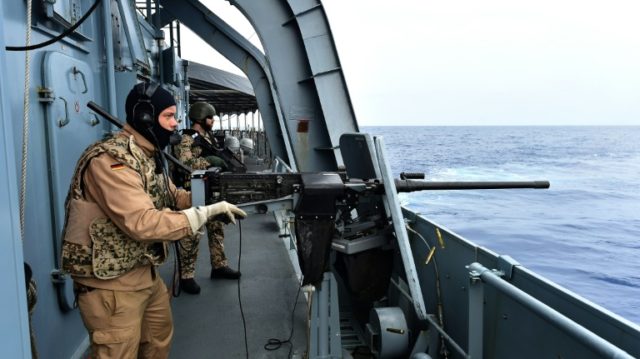United Nations (United States) (AFP) – The UN Security Council on Tuesday authorized an EU naval force to intercept ships suspected of arms smuggling to Libya, moving to shore up Tripoli’s unity government as it battles the Islamic State group.
The council unanimously adopted a resolution drafted by Britain and France that expands the mission of Operation Sophia, which has been combating migrant trafficking in the Mediterranean.
French Ambassador Francois Delattre, who holds the council’s presidency this month, said the measure is a potential “game-changer,” by cutting off the arms flow “that feeds the instability” in Libya.
But Russia warned that the measure could deepen divisions in Libya, which has been in turmoil since the 2011 fall of Moamer Kadhafi.
Operation Sophia’s enforcement of an arms embargo is aimed at supporting the UN-backed unity government as it struggles to establish its authority over the entire north African country.
Militias loyal to the UN-backed government of Prime Minister Fayez al-Sarraj are battling to retake the key city of Sirte from IS jihadists.
Following the UN vote, EU foreign ministers were expected to formally task Operation Sophia with combating arms smuggling when they meet in Luxembourg on Monday.
EU foreign policy chief Federica Mogherini said in a statement welcoming the vote that Operation Sophia would “play an important role” in enforcing the arms embargo.
The embargo was imposed on Libya in 2011, but UN sanctions monitors have reported shipments from Egypt, Turkey, the United Arab Emirates and Sudan to various factions.
British Ambassador Matthew Rycroft said “the existing arms embargo has not fully stopped the flow of weapons” and that action was needed to prevent shipments from reaching IS fighters.
Libya is awash with weapons, with some 20 million pieces of armaments of all types in a country of six million people, according to the United Nations.
– Seize and dispose –
The resolution invokes Chapter 7 of the UN charter, which allows for the use of military force.
It grants a 12-month mandate to EU vessels to “inspect, without undue delay, on the high seas off the coast of Libya, vessels bound to, or from Libya which they have reasonable grounds to believe are carrying arms or related material to or from Libya.”
Russian Deputy Ambassador Vladimir Safronkov warned the measure could sow division by “helping some Libyans against others.”
Safronkov recalled that militias loyal to Libyan General Khalifa Haftar, who has refused to back the unity government, were “effectively pushing back” against IS jihadists.
“It is inadmissible to ignore this,” he told the council.
In a concession to Russia, the resolution included a mention that the EU naval force must “make good-faith efforts” to first seek consent from the ship’s flag state before carrying out any inspection.
EU vessels are authorized to “use all measures commensurate to the specific circumstances to carry out such inspections” on the high seas, off Libya’s coast.
The EU force received UN permission to “seize and dispose” of the weapons and divert vessels and their crew to a nearby port.
The adoption of the resolution coincides with a push to grant the Sarraj government an exemption to the arms embargo for purchases of military equipment to confront IS and rival militias.
That request for an exemption, however, is conditional on receiving assurances from the unity government that it will properly store and keep track of the new weapons to prevent them from falling in the wrong hands.
Council members also want Tripoli to provide a clear command structure of the various militias that are now claiming to be fighting on the unity government’s behalf.

COMMENTS
Please let us know if you're having issues with commenting.